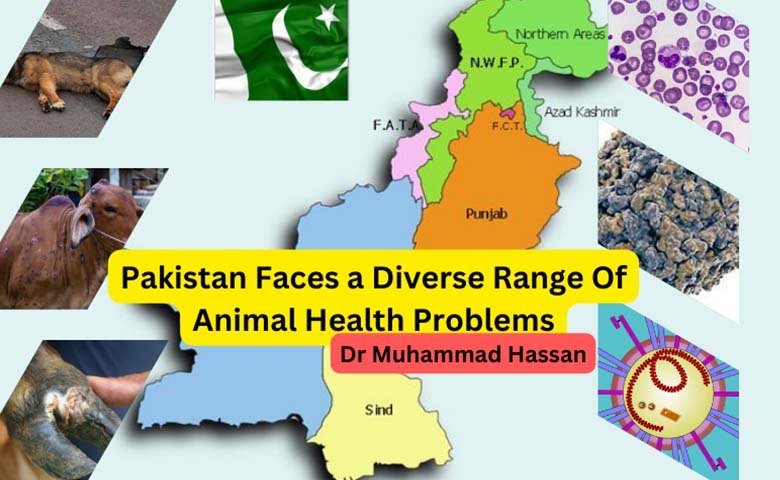Pakistan faces a diverse range of animal health problems, impacting both livestock and companion animals. Here are some of the top concerns:

Livestock:
- Infectious diseases:
- Foot and mouth disease (FMD): Highly contagious, impacting cloven-hoofed animals, causing significant economic losses.
- Lumpy skin disease (LSD): Viral disease causing nodules on the skin, reducing milk production and marketability.
- Peste des petits ruminants (PPR): Affects goats and sheep, causing fever, pneumonia, and diarrhea.
- Parasitic diseases:
- Gastrointestinal nematodes: Roundworms and tapeworms affect digestion and weight gain.
- Ticks and fleas: Transmit vector-borne diseases like babesiosis and theileriosis.
- Nutritional deficiencies: Limited access to quality feed and minerals, particularly in resource-constrained areas.
- Reproductive problems: Poor breeding management, infertility issues due to infections, or nutritional deficiencies.
Companion animals:
- Rabies: Zoonotic viral disease transmitted through bites, posing a public health risk.
- Canine distemper: Highly contagious viral disease in dogs, affecting the respiratory, gastrointestinal, and nervous systems.
- Parvovirus: Viral disease in dogs, causing severe gastrointestinal distress and potential death, particularly in puppies.
- Skin diseases: Mange, fungal infections, and allergies, often due to poor hygiene or inadequate nutrition.
- Accidents and injuries: Road accidents, dog fights, and other traumas are common threats, especially in urban areas.
Underlying challenges:
- Limited access to veterinary care: Rural areas often lack veterinary services, resulting in delayed diagnosis and treatment.
- Inadequate awareness and knowledge: Farmers and pet owners may lack basic animal health knowledge, leading to improper care and disease control practices.
- Poor sanitation and hygiene: Unsanitary environments contribute to the spread of infectious diseases, further impacting animal health.
- Lack of resources: Limited government funding and infrastructure hinder effective disease control programs and vaccine availability.
Efforts and initiatives:
Despite these challenges, several efforts are underway to improve animal health in Pakistan.
- Vaccination programs target major infectious diseases in livestock.
- Awareness campaigns educate farmers and pet owners about animal health practices.
- Establishment of veterinary clinics and mobile veterinary services in rural areas.
- Research and development of new vaccines and diagnostics for improved disease control.
Addressing these top animal health problems requires a multi-pronged approach involving the government, veterinary professionals, farmers, pet owners, and research institutions. By working together, Pakistan can improve the health and welfare of its animals, leading to increased productivity, food security, and public health benefits.
Please let me know if you’d like more information about specific animal health problems, initiatives, or resources available in Pakistan.